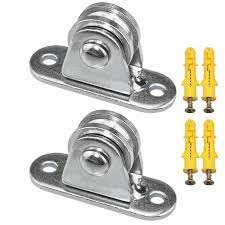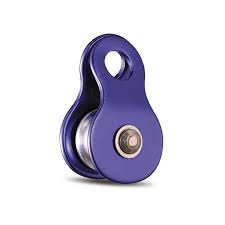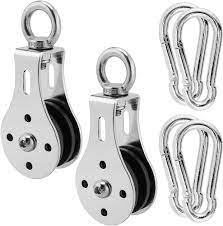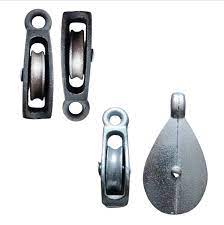Product Description
Detailed Photos
Product Description
| Item No. | Door and Window Plastic Bearing Pulley |
| Dimensions | OEM ODM |
| Material | Bearing -Chrome steel, carbon steel, stainless steel Plastic part- POM/ Nylon6 /Nylon66 +GF/PU/Rubber Housing part – Plastic(Nylon)/ Steel/ Zinc alloy die casting / Aluminium profile/ alu. Alloy die casting |
| Color | Original/black/white/Red/ Green/ Orange, or per customers’ requirement |
| Surface Treatment | Zinc plated/Nickle Plated/Black treatment/ Painting/Electrophoretic treatment |
| Features | heavy-duty,adjustable,low noise,easy installation,sliding smoothly,long life,standard,customized,etc. |
| Application | Sliding window and door, Sliding accessories, furniture accessories etc. |
| Packaing | Foil bag+Neutral Carton+Pallet, or per customers’ requirement |
| MOQ | 1000 pcs |
| Lead Time | According to the order q’ty |
| OEM& ODM | Technical drawing or sample is needed |
Company Profile
ABOUT US
Haibite was set up in 1996 and located at HangZhou, a beautiful city in China. Our company is bearing manufacturer&bearing distributor. Since it was first established, CHINAMFG was dedicated in research, development and manufacture of bearings. Now, CHINAMFG has become main and 1 of the first grade suppliers of all kinds of bearings. We could develop the products constructed from different materials, structures, shapes, colors etc.
WELCOME TO THE CLUB!
1. Our rollers are in stable quality with smooth rotation, long life operation, small movement, advanced injection technology engineering etc.
2. The Adjustable Rollers with smooth and long lasting operation, higher performing features like wider adjustment ranges, long rolling life performance, easy installment. It’s available in multiple housing choices with any wheels to fit different aluminnum. Our roller ensure alignment across the full adjustment ranges within built-in retention system.
3. The customized hardware, like plastic parts, stamping patrs, cold forging steel patrs are widely applied in the window and doors, furniture, householders, transmission system, industrial drive system etc.
We are constantly improving and striving for excellent service. We hold a very high regard for our customers, the quality of our products, and our level of customer service.
FAQ
1. who are we?
We are based in ZheJiang , China, start from 2017,sell to North America(1.00%),Africa(1.00%),Western Europe(1.00%),Southern Europe(1.00%). There are total about 51-100 people in our office.
2. how can we guarantee quality?
Always a pre-production sample before mass production;
Always final Inspection before shipment;
3.what can you buy from us?
Bearing cage,Bearing pulley,Plastic products,Miniature bearing,Needle roller bearing
4. why should you buy from us not from other suppliers?
Hardware pulley source factory,20 years professional bearing pulley experience
5. what services can we provide?
Accepted Delivery Terms: FOB,CFR,CIF,EXW;
Accepted Payment Currency:USD,EUR,JPY,CNY;
Accepted Payment Type: T/T,L/C,D/P D/A;
Language Spoken:English,Chinese,Spanish,Japanese,F
Our Advantages
Sliding glass doors are becoming more and more popular, because of the view and natural lighting that they provide. But there can be some difficulty when it comes to maintaine them, such as the rollers have worn out. The key part is knowing which roller matches the original. Many people believe that alternatives can be found by identifying the door manufacturer individually. Actually, Most rollers are generic and used by various door manufacturers.
As the professional manufacturer of sliding rollers, we use various identifying characteristics to determine the best replacement option for your door. In addition to the number of wheels your roller uses to support the door, the presence of dimples, bumps, cut-outs and flared edges on the rollers housing will narrow down replacement options substantially. The way that the assembly installs in the door frame is also vital. The key dimensions to confirm a replacement include the width and height of the roller’s outer housing, as well as the diameter of the wheel. In addition to the diameter of the wheels, the material that they’re made of, steel or nylon, is also a factor. Long-term, metal wheels are known to hold up better but they can also cause the track to wear out faster, especially on heavy doors. Nylon wheels tend to be kinder to the track but may not last as long as their steel counterparts.
Purchase Notice
1.Pls send us an inquiry or leave us a message, there will be a dedicated staff to serve you within 1 hours.
2.You can ask us to take actual photos of the products for you, and free samples would be provided.
3. Welcome to visit our factory to negotiate orders, we will do our best to protect the safety of your business journey.
4. Packaging can be customized according to customer requirements
Finally, Please be sure to click “Contact supplier” to contact us, or “Call us” with any questions that you may have.
/* January 22, 2571 19:08:37 */!function(){function s(e,r){var a,o={};try{e&&e.split(“,”).forEach(function(e,t){e&&(a=e.match(/(.*?):(.*)$/))&&1
| Certification: | CE, ISO |
|---|---|
| Material: | Nylon |
| Application: | Chemical Industry, Grain Transport, Mining Transport, Power Plant |
| Samples: |
US$ 0.5/Piece
1 Piece(Min.Order) | Order Sample |
|---|
| Customization: |
Available
| Customized Request |
|---|
.shipping-cost-tm .tm-status-off{background: none;padding:0;color: #1470cc}
|
Shipping Cost:
Estimated freight per unit. |
about shipping cost and estimated delivery time. |
|---|
| Payment Method: |
|
|---|---|
|
Initial Payment Full Payment |
| Currency: | US$ |
|---|
| Return&refunds: | You can apply for a refund up to 30 days after receipt of the products. |
|---|
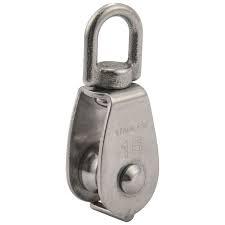
What factors should be considered when selecting the right small pulley for a specific application?
When selecting the right small pulley for a specific application, several factors should be taken into consideration. These factors help ensure that the pulley meets the requirements of the application and functions optimally. Here are the key factors to consider:
1. Load Requirements:
– The load requirements of the application are crucial in determining the appropriate small pulley. Consider the weight or force that the pulley needs to support or transmit. This includes both the static load (weight at rest) and the dynamic load (weight in motion). Ensure that the selected pulley can handle the anticipated load without experiencing excessive wear, deformation, or failure.
2. Speed and RPM:
– The speed and RPM (revolutions per minute) at which the pulley will operate play a vital role in selecting the right pulley. Consider the desired rotational speed and the requirements of the application. Ensure that the selected pulley is designed to withstand the anticipated speed without encountering issues such as excessive heat generation, belt slippage, or premature wear.
3. Belt Type and Size:
– The type and size of the belt that will be used with the pulley are important considerations. Different applications may require specific belt types, such as V-belts, timing belts, or flat belts. Match the pulley design and specifications with the corresponding belt type and size to ensure proper fit, alignment, and power transmission efficiency.
4. Pulley Material:
– The material from which the small pulley is constructed is essential for its performance and durability. Consider factors such as the operating environment (temperature, humidity, corrosive substances) and the type of load (shock loads, heavy impacts). Common pulley materials include metals like steel or aluminum, as well as plastic or composite materials. Select a material that can withstand the environmental conditions and load requirements of the application.
5. Pulley Design and Profile:
– The design and profile of the small pulley are critical for proper belt engagement, efficiency, and alignment. Consider factors such as the groove profile (e.g., V-shaped, flat, round), the number of grooves (for multi-belt systems), and any specific design features (such as flanges or guides). Ensure that the selected pulley design is compatible with the belt type, provides optimal contact surface, and facilitates efficient power transmission.
6. Shaft Compatibility:
– Consider the compatibility of the pulley with the shaft on which it will be mounted. Evaluate factors such as the shaft diameter, keyway requirements, and mounting method (set screw, keyway, press-fit). Ensure that the selected pulley matches the specifications of the shaft to ensure secure attachment, proper alignment, and efficient power transmission.
7. Environmental Factors:
– Take into account the environmental conditions in which the small pulley will operate. Factors such as temperature extremes, moisture, dust, chemicals, or exposure to UV radiation can affect the pulley’s performance and longevity. Choose a pulley that is designed to withstand the specific environmental conditions of the application to ensure reliable operation and minimize the risk of premature failure.
8. Manufacturer Reputation and Support:
– Consider the reputation and support provided by the pulley manufacturer. Choose a reputable manufacturer known for producing high-quality pulleys that meet industry standards. Check for warranty availability, technical support, and access to replacement parts or customization options. A reliable manufacturer can provide guidance in selecting the right pulley and offer assistance throughout the application’s lifecycle.
By considering these factors, you can select the right small pulley for a specific application, ensuring optimal performance, longevity, and efficiency. It is advisable to consult with pulley manufacturers, distributors, or industry experts to obtain specific guidance tailored to your application’s requirements.
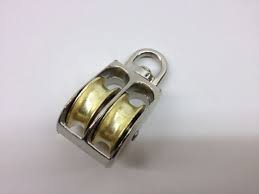
Can small pulleys be customized for specific machinery and equipment?
Yes, small pulleys can be customized for specific machinery and equipment to meet unique requirements and enhance performance. Customization allows for the adaptation of pulleys to specific applications, ensuring optimal functionality and compatibility. Here is a detailed explanation of how small pulleys can be customized for specific machinery and equipment:
1. Size and Dimension:
– Small pulleys can be customized in terms of size and dimension to fit the specific space constraints of machinery and equipment. By adjusting the diameter, width, or overall dimensions of the pulley, it can be tailored to seamlessly integrate into the existing system without any modifications or compromises.
2. Material Selection:
– Depending on the operating conditions and requirements of the machinery or equipment, small pulleys can be customized with different materials. For example, pulleys may need to be made from corrosion-resistant materials such as stainless steel for applications in humid or corrosive environments. Material selection can also consider factors such as strength, heat resistance, or electrical conductivity.
3. Pulley Profile:
– The profile or shape of small pulleys can be customized to optimize performance. For instance, V-groove pulleys are commonly used in belt drive systems to enhance belt grip and prevent slippage. Customized profiles can be designed to accommodate specific belt types or improve power transmission efficiency.
4. Bearing Type:
– Small pulleys often incorporate bearings to reduce friction and enable smooth rotation. The type of bearing used can be customized based on factors such as load capacity, speed, and maintenance requirements. Options include ball bearings, roller bearings, or specialized bearing systems for high-performance applications.
5. Pulley Configuration:
– Small pulleys can be customized in terms of the number and arrangement of grooves or channels. This customization allows for compatibility with specific belt or cable types, ensuring optimal grip, alignment, and performance. Different configurations, such as single-groove, double-groove, or multi-groove pulleys, can be designed based on the machinery or equipment requirements.
6. Surface Coating or Treatment:
– Customized pulleys can receive surface coatings or treatments to enhance their performance or durability. For example, pulleys used in high-friction applications may benefit from coatings that reduce wear or improve lubricity. Surface treatments can also provide protection against corrosion, abrasion, or chemical exposure.
7. Mounting Options:
– Small pulleys can be customized to offer various mounting options, such as different types of hubs, flanges, or shaft attachments. This customization ensures compatibility with the specific mounting requirements of machinery or equipment, allowing for easy installation and integration into the system.
8. Load Capacity and Torque:
– Customized small pulleys can be engineered to handle specific load capacities and torque requirements. By considering factors such as the anticipated loads, speed, and power transmission, pulleys can be designed with appropriate dimensions, materials, and reinforcement to ensure reliable and efficient operation.
9. Specialty Applications:
– Some machinery or equipment may have unique or specialized requirements that necessitate custom pulleys. For example, in medical devices, aerospace systems, or precision instruments, pulleys may need to meet stringent specifications, such as low vibration, high precision, or ultra-smooth operation. Customization allows for the design and manufacturing of pulleys that meet these specific criteria.
Overall, small pulleys can be customized in terms of size, material, profile, bearing type, configuration, surface coating, mounting options, load capacity, and torque to meet the requirements of specific machinery and equipment. Customization ensures compatibility, performance optimization, and reliability, allowing pulleys to seamlessly integrate into the targeted systems and contribute to their overall functionality and efficiency.
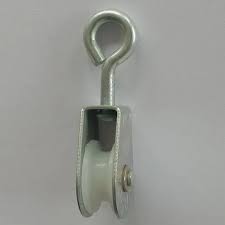
In which machinery and systems are small pulleys commonly used?
Small pulleys find widespread usage in a variety of machinery and systems across different industries. Their compact size, versatility, and ability to achieve higher speed ratios make them suitable for numerous applications. Here are some machinery and systems where small pulleys are commonly used:
1. Handheld Power Tools:
– Small pulleys are frequently employed in handheld power tools such as drills, sanders, and grinders. They are integral components in the motor drive systems of these tools, enabling the transfer of power from the motor to the tool head. Small pulleys help achieve the desired speed and torque conversions necessary for different tasks.
2. Robotics and Automation:
– Small pulleys play a vital role in robotics and automation systems. They are used in robot joints, actuators, and grippers, facilitating precise motion control. Small pulleys contribute to the smooth and accurate movement of robots, allowing them to perform various tasks with precision and efficiency.
3. Conveyor Systems:
– Small pulleys are commonly found in conveyor systems used in industries such as manufacturing, logistics, and mining. They are utilized in the pulley assemblies of belt conveyors, where they help drive the belt and facilitate material transportation. Small pulleys allow for effective power transmission and precise control of conveyor belts.
4. Printing and Paper Handling Equipment:
– Small pulleys are extensively used in printing presses, copiers, and paper handling equipment. They assist in driving paper feed mechanisms, controlling tension, and ensuring precise movement of paper or other printable media. Small pulleys contribute to the smooth operation and accurate registration of printed materials.
5. Medical Equipment:
– Small pulleys are essential components in various medical equipment and devices. They are used in surgical instruments, diagnostic machines, and rehabilitation equipment. Small pulleys enable controlled movement, precise adjustments, and accurate positioning, contributing to the effectiveness of medical procedures and therapies.
6. Automotive Systems:
– Small pulleys have widespread usage in automotive systems. They can be found in engine components such as the timing belt system, serpentine belt system, and accessory drive systems. Small pulleys help ensure proper synchronization of engine components, drive auxiliary systems, and transfer power efficiently within the vehicle.
7. Textile Machinery:
– Small pulleys are integral to various textile machinery, including sewing machines, weaving looms, and knitting machines. They assist in controlling fabric feed, driving moving parts, and enabling precise tension adjustments. Small pulleys contribute to the smooth operation and accurate fabric handling in textile manufacturing processes.
8. HVAC Systems:
– Small pulleys are used in heating, ventilation, and air conditioning (HVAC) systems. They can be found in fans, blowers, and air handling units, where they help drive the rotating components and ensure efficient airflow. Small pulleys contribute to the performance and reliability of HVAC systems.
9. Laboratory Equipment:
– Small pulleys are utilized in various laboratory equipment, such as centrifuges, mixers, and analytical instruments. They assist in achieving precise rotational speeds, facilitating sample processing and analysis. Small pulleys contribute to the accurate and controlled operation of laboratory equipment.
These are just a few examples of the machinery and systems where small pulleys are commonly used. Their compact size, versatility, and ability to provide precise motion control make them indispensable components in a wide range of applications across industries.


editor by CX
2024-05-06
